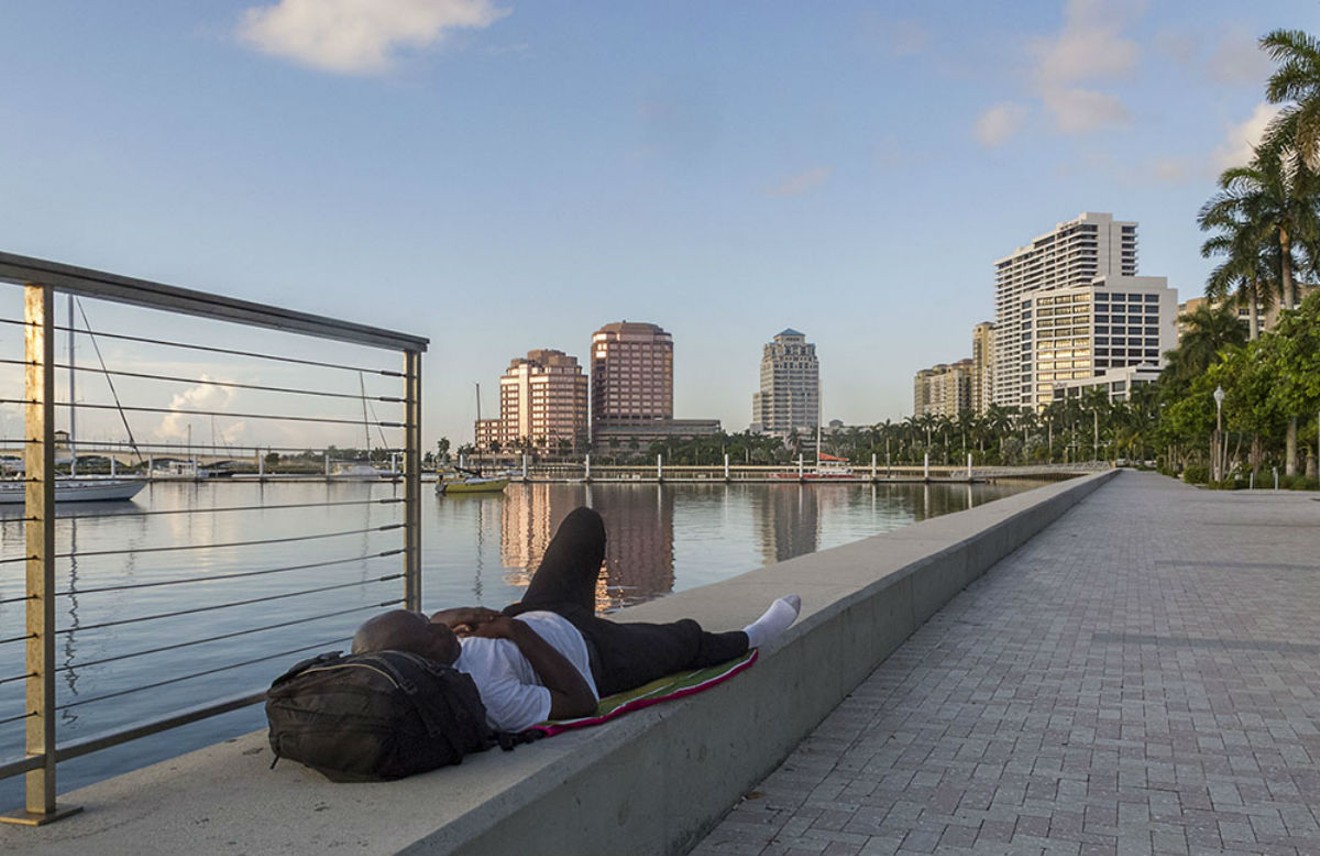Four years ago, a topless woman sauntered into the Johnny Rockets on Ocean Drive, twerked on a table, stripped nude, and allowed a group of men to slather ketchup on her body. A video of the incident infamously went viral on WorldStarHipHop, where it has garnered 2.8 million views to date.
But days after the clip broke the internet, the woman's father told New Times his daughter was not trying to create a spectacle — instead, he said, she was suffering from severe mental illness.
"She was clearly not in her proper mind," he said at the time.
Under a new bill making its way through the Florida Legislature, however, mentally ill or homeless people could be hit with felony charges for such displays of public nudity. HB 675 would elevate certain kinds of indecent exposure to felonies, which would allow police to arrest people without needing a warrant and without personally witnessing any nudity.
Supporters of the legislation say police need the power to stop repeat offenders, while critics warn it could lead to the unnecessary criminalization of mentally ill or homeless people.
"This bill could cause huge amounts of collateral damage," says David Peery, an advocate who works with the homeless in Miami. "It would expose homeless people to criminality simply because they are homeless."
Under Florida law, public nudity is largely a misdemeanor offense. And officers must obtain a warrant before making an arrest unless they witnessed the crime in person.
As it stands, the law says it's a felony to get naked in the presence of a person younger than 16 years of age if done in a "lewd" manner — for instance, attempting to arouse oneself sexually or exposing genitalia in an exhibitionist fashion. The bill's two Democratic sponsors — Orange County state Rep. Amy Mercado and Orlando state Sen. Linda Stewart — believe the age limit should be eliminated to better crack down on repeat offenders.
"We know that when violators get away with this type of act, they often feel emboldened to continue," Stewart said in a news release last week. "We want to give law enforcement the tools they need in order to stop this type of behavior in its tracks."
Across Florida, there were 175 indecent exposure arrests in the 2019 fiscal year and 162 the previous year, according to a staff analysis of Mercado's bill.
Supporters of the bill, including Miami Democratic state Rep. Michael Grieco, are quick to point out that the bill's language distinguishes between behavior such as public urination and more lewd and sexual behavior. Grieco, a former prosecutor, says the law would give officers significant discretion when it comes to deciding what does and what doesn't count as felony-worthy nudity. Yet because the law requires only a reasonable belief that someone has committed a felony for an officer to make an arrest, critics worry that someone could be arrested based on a bystander's interpretation of whether an instance of nudity was lewd.
"How do you verify the veracity of these claims and these witnesses? How do you ensure there's no improper motive in the accusation and arrest?" Peery asks. "This bill would open up a whole can of worms when it comes to how police treat homeless people."
Beyond giving police more power to make arrests, the new bill also dramatically increases the legal stakes of those arrests. In a state such as Florida, where poor defendants aren't always guaranteed a public defender, a wrongfully arrested homeless person more than likely couldn't afford to contest the charges in court.
"A felony on your record is a barrier to getting many kinds of assistance if you're homeless, especially public housing assistance," says Megan Hustings, managing director of the National Coalition for the Homeless. "In Florida in particular, there are people who have been arrested for urinating outside that had to register as sex offenders. That prevented them from going into homeless shelters where they might have gotten case management to help them find a job or get healthcare."
Grieco believes compromise regarding the bill is possible, and he says there have been conversations between lawmakers to that effect. Instead of making it a felony, legislators could add indecent exposure to the list of misdemeanor offenses that don't require a warrant from an officer to make an arrest. Advocates such as Peery would prefer to see a solution that involves expanding access to social services and treatment for the homeless and mentally ill.
Both the House and Senate bills have passed through committee and now await a full vote. If the bill is passed, the new law would go into effect at the beginning of October.
[
{
"name": "Air - MediumRectangle - Inline Content - Mobile Display Size",
"component": "19274298",
"insertPoint": "2",
"requiredCountToDisplay": "2"
},{
"name": "Editor Picks",
"component": "17482312",
"insertPoint": "4",
"requiredCountToDisplay": "1"
},{
"name": "Inline Links",
"component": "18711090",
"insertPoint": "8th",
"startingPoint": 8,
"requiredCountToDisplay": "7",
"maxInsertions": 25
},{
"name": "Air - MediumRectangle - Combo - Inline Content",
"component": "17482310",
"insertPoint": "8th",
"startingPoint": 8,
"requiredCountToDisplay": "7",
"maxInsertions": 25
},{
"name": "Inline Links",
"component": "18711090",
"insertPoint": "8th",
"startingPoint": 12,
"requiredCountToDisplay": "11",
"maxInsertions": 25
},{
"name": "Air - Leaderboard Tower - Combo - Inline Content",
"component": "17482313",
"insertPoint": "8th",
"startingPoint": 12,
"requiredCountToDisplay": "11",
"maxInsertions": 25
}
]












